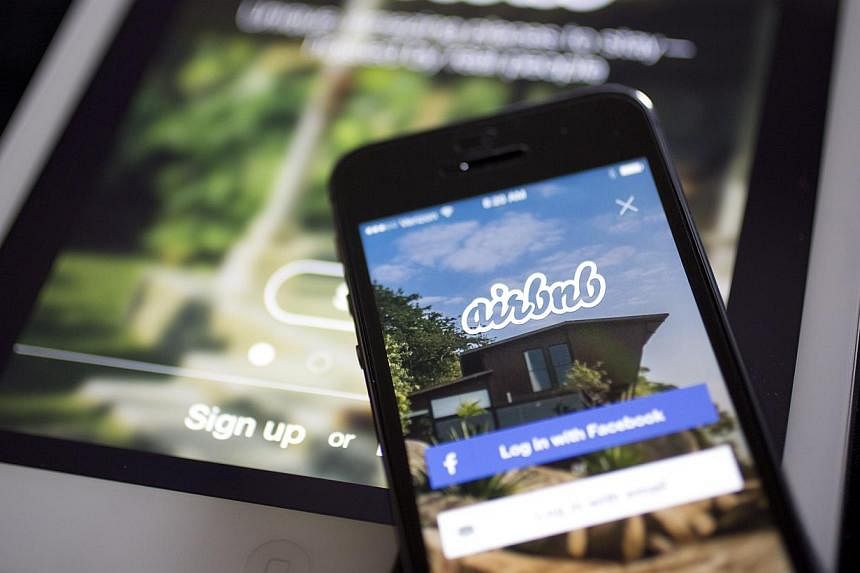WASHINGTON (AFP) - Want to make a bit of extra cash driving strangers around in your car, taking care of someone's dog, renting your apartment or cooking a meal?
Welcome to the sharing economy.
With Internet-based apps and services like Uber, Airbnb and others, you make money, and the consumer saves. So it's a win-win? That's the multibillion-dollar question.
The new way of operating has been reshaping entire economic sectors, with the promise of improved efficiency and more flexibility.
The spectacular rise of ride-sharing, home-sharing and other services turned these economic models upside down, and has fuelled complaints that these services effectively skirt rules on safety, consumer protection and labour rights.
Some economists say this "peer-to-peer" model offers numerous advantages by tapping underutilised resources.
The sharing economy "can improve consumer welfare by offering new innovations, more choices, more service differentiation, better prices and higher quality services," says a study by George Mason University economists.
Researcher Christopher Koopman, an author of the George Mason report, said the sharing economy "allows people to take idle capital and turn them into revenue sources." "People are taking spare bedroom, cars, tools they are not using and becoming their own entrepreneurs."
There is no official definition of the sharing economy. Some include online delivery services like Instacart and Postmates; neighbour-sharing platforms like Peerby; pet-sitting service DogVacay; and the restroom service Airpnp.
The research firm PwC estimates that five sharing economy segments - finance, online staffing, accommodation, car sharing and music or video streaming -could be worth US$335 billion (S$418.85 billion) by 2025, up from just US$15 billion today.
"The sharing economy will be part of the overall economy going forward," said technology strategist Mary Jesse in a blog post.
"Some industries - like taxi services in transportation and B&B rentals in travel - will be completely transformed, while others, such as financial services, will be only peripherally impacted. This is part of the 'technology revolution,' as well as a new norm."
Arun Sundararajan, a New York University economist who studies the sharing economy, told a January congressional hearing that "this transition will have a positive impact on economic growth and welfare, by stimulating new consumption, by raising productivity, and by catalysing individual innovation and entrepreneurship."
INNOVATION OR RULE-BENDING?
Uber is the best known platform in the sharing economy, having reached a valuation of US$40 billion while expanding to more than 200 cities in 54 countries.
But Uber and similar services like Lyft and Sidecar have fuelled heated protests from taxi drivers, who complain that the new entrants don't have to meet the same requirements for licencing, safety and insurance, making the competition unfair.
Airbnb, the leading online platform for peer-to-peer lodging, has sparked similar complaints from the hotel sector. Responding to complaints, the San Francisco startup recently expanded efforts to collect lodging taxes in some locations.
Other services in the sharing economy include "Feastly", which allows individuals to cook meals for customers; Vinted, a marketplace for unwanted clothing; and Lending Club, one of several platforms for peer-to-peer loans.
Dean Baker, an economist with the left-leaning Centre for Economic and Policy Research in Washington, said these players can thrive largely because they don't play by the same rules as incumbents.
"It doesn't make sense to have a regulated sector and another one where the rules don't apply," Baker told AFP.
"What you want to do is separate out where they deliver innovation or create a real benefit."
Baker said ride-sharing services have raised particular concerns because drivers are competing against taxis, which are limited by most cities under a licencing scheme such as the "medallions" in San Francisco which can sell for US$250,000 or so.
"There is an issue of fairness," Baker said. "If the cities want to let anyone drive, they should buy back the medallions."
JOBS OR NOT?
From the labour perspective, the new digital platforms are touted as ways to encourage more people to become entrepreneurs.
A study commissioned by Uber and led by Princeton University economist Alan Kreuger which surveyed US drivers for Uber found they earned above-average wages and were generally satisfied with the arrangement.
The study found Uber driver earned around US$6 per hour more than traditional taxi drivers, but noted that comparison is difficult because Uber drivers must pay certain expenses.
Baker says this arrangement "is great for people to have an option to work in their spare time and make extra money," but that it still lacks the benefits of full-time employment.
"What happens when someone has an accident? Do they have workers comp (insurance)?," he said.
Baker said imposing regulations and costs on sharing economy firms could hurt their profitability but would level the playing field.
"These companies are going to have a choice where they have to get serious about accepting reasonable regulation or they will be chased out of business," he said.
Koopman argues however that "a lot of these regulations that have been on the books for decades are no longer serving consumer needs and are just protecting industries from competition."
He maintains that as these activities grow, "there will be a new generation of people who are looking to the sharing economy both from the consumer and the producer side. And governments are ultimately going to have to respond."

